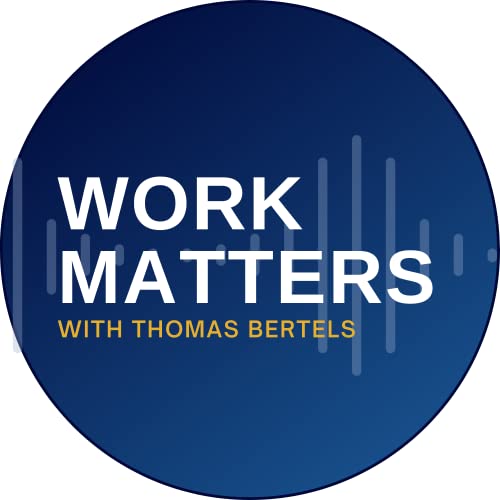In this episode of Work Matters, Thomas and Tina Robinson discuss why engagement matters for leaders and how to make it personal.
Tina is the founder of Work Joy, a leadership development and coaching boutique. For 25 years, Tina has played at the intersection of humans, technology, and work. In her corporate days, Tina directed global change management initiatives, overhauled HR functions, transformed team cultures, implemented workforce technology solutions, created and facilitated leadership development programs, and spearheaded complex sales operations programs for organizations such as PwC, Toyota, and SAP. As CEO of WorkJoy, Tina builds on this diverse expertise, making content engaging and relevant as a facilitator and unleashing individual potential as a coach. As a strategic advisor, she applies her systems thinking to align people, processes, and technology with business priorities, helping clients secure the executive commitment needed to drive critical outcomes. Tina is an honors graduate of the University of Virginia (BA) and University of Michigan (MBA) and is certified through the International Coaching Federation. She is a thought leader online and in print, is a sought-after and highly rated speaker at international conferences, and is a former adjunct professor at Loyola Marymount University.
In this conversation, we explore:
Why employee engagement matters
- Engagement is the emotional and social connection employees have with their work.
- High engagement leads to better performance, reduced sick days, and higher revenue.
- Organizations with high engagement levels see better customer service and overall results.
What is the current state of engagement
- Gallup's latest survey shows engagement is at its lowest since 2013, with only 30% of employees feeling engaged.
- The majority of employees (70%) feel disengaged, highlighting a significant challenge for organizations.
What are common pitfalls of engagement programs
- Many organizations view engagement as an output rather than an input, leading to ineffective programs.
- Engagement is personal and varies from individual to individual; broad programs often fail to address these unique needs.
Why and how to personalized engagement
- Leaders should have personal conversations with employees to understand what engages them.
- These conversations should be ongoing, not just during the hiring process.
- Understanding individual motivators and needs is crucial for maintaining engagement.
How leaders can facilitate engagement
- Leaders should create environments that support engagement conversations.
- Engagement is a two-way street, requiring both leaders and employees to communicate openly.
- Leaders should be brokers, aligning organizational needs with employee desires.
- Invest in training leaders to have meaningful engagement conversations.
- Use engagement surveys as a tool, but ensure follow-up actions are taken based on the results.
- Focus on metrics that directly contribute to business outcomes, such as turnover and retention of high performers.
- Creating a psychologically safe environment is key to fostering engagement.
- Trust is built through consistent, supportive interactions between leaders and employees.
Engagement is a challenge but not impossible to improve with the right strategies. Personalized approaches and fostering open communication are essential. Tina emphasizes the importance of making engagement personal through better conversations.
To learn more about Tina and her work
- Connect with Tina Schust Robinson on LinkedIn: https://www.linkedin.com/in/tinaschustrobinson/
- Email Tina for...
 32 mins
32 mins 34 mins
34 mins 30 mins
30 mins 30 mins
30 mins 44 mins
44 mins 29 mins
29 mins Apr 10 202440 mins
Apr 10 202440 mins 49 mins
49 mins
